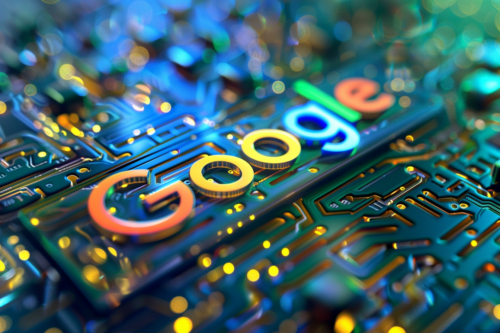
This article delves into the relationship between AI-generated content and search engine optimization. It addresses concerns about potential penalties from search engines and highlights the importance of quality and human touch in AI-assisted content creation
The digital marketing landscape is witnessing a transformative era with the advent of AI-generated content. This technological leap has redefined content creation, introducing a new dynamic between traditional writing and innovative AI tools. As businesses and content creators increasingly adopt AI for crafting articles, blogs, and web content, the intersection of AI and content strategy becomes a critical point of discussion. These AI writing tools, powered by advancements in natural language processing and machine learning, promise efficiency and scalability, but they also bring forth questions about their impact on search engine rankings and compliance with SEO standards. The prevalent concern is whether this AI-assisted content creation could potentially harm a website’s search engine visibility, a critical aspect for digital success.
The integration of AI in content creation is not just a fad but a significant shift in how content is produced. The capabilities of AI writing tools like ChatGPT and others have opened new possibilities for scaling content production while maintaining quality. They offer a solution to the time-intensive process of writing, providing a foundation upon which human creativity can build. However, with 85.1% of marketers reportedly using AI for article writing, there is a growing apprehension about the response of search engines, particularly Google, to this AI-generated content. This uncertainty stems from the need to balance the efficiency of AI with the quality and authenticity that search engines demand, making it a pivotal subject for content creators and digital marketers alike.
AI-generated content is defined as text that is produced by software algorithms rather than crafted by human authors. This type of content is typically generated with minimal human effort, relying on the capabilities of AI and machine learning models to produce written material. The essence of AI-generated content lies in its ability to process large volumes of data, understand language patterns, and create text that mimics human writing. The advancements in natural language processing and machine language models have led to the proliferation of AI writing tools in the market, making them an attractive option for writers and publishers. These tools not only aid in scaling content production but also contribute to enhancing the overall quality of the content, reducing the time spent on research and drafting.
Despite the apparent benefits, the use of AI-generated content has sparked a debate within the SEO community. Many publishers and content creators fear that their reliance on AI tools, such as ChatGPT, might lead to penalties from search engines. This concern is valid, considering the emphasis search engines place on original, high-quality content. The apprehension is rooted in the potential for AI to produce content that could be perceived as lacking originality or being overly formulaic. As a result, there is a growing need to understand how search engines, particularly Google, view and evaluate AI-generated content, and how it fits within the broader framework of SEO and content marketing.
As AI-generated content becomes more commonplace, one of the key questions that arise is whether Google can detect content created by AI. Recent developments indicate that Google and various third-party tools have significantly improved their ability to identify machine-generated content. They employ a range of techniques, including sophisticated natural language processing (NLP) algorithms, which analyse text patterns, syntax, and other linguistic elements that are characteristic of computer-generated writing. This ability of Google to discern AI content underscores the importance for content creators to be mindful of how they use AI tools in their content strategy. It reflects the search engine’s commitment to maintaining the integrity and quality of content on its platform.
In light of Google’s capabilities to detect AI-generated content, it is crucial to understand its stance and approach towards such content. Google has explicitly stated that AI-generated content is not inherently against its search guidelines. The primary concern of the search giant is not the method of content creation, but rather the quality and value that the content delivers to users. Google’s recent updates, including the helpful content update, have focused on promoting high-quality, audience-centric content, irrespective of whether it is written by humans or generated by AI. This indicates a shift from purely method-based evaluation to a more quality-focused approach. Content creators must, therefore, ensure that their use of AI aligns with Google’s emphasis on providing valuable, informative, and user-friendly content
The “helpful content update” from Google marks a pivotal moment in the search engine’s ongoing efforts to refine its algorithms. This significant update is designed to prioritise content that demonstrates a clear focus on satisfying user queries and providing value. The criteria include content created with a specific audience in mind, showcasing expertise, and aligning with the broader thematic focus of the website. Additionally, it emphasises the importance of fulfilling search intent and adhering to Google’s comprehensive webmaster guidelines, including the principles of E-E-A-T (Expertise, Experience, Authoritativeness, and Trustworthiness). This update has profound implications for AI-generated content, raising questions about its compliance with these enhanced quality standards.
The relationship between Google’s helpful content update and AI-generated content is intricate and multifaceted. Contrary to popular belief, this update was not specifically targeted at AI-generated content. Instead, it underscores Google’s commitment to promoting high-quality content, irrespective of its origin. Initially, Google’s documentation suggested that helpful content should be “written by people,” but this statement was later removed, subtly indicating that the use of AI in content creation is not a primary concern. The key takeaway is that Google’s algorithm updates are more concerned with the end product’s quality and value to the user rather than the methods used to create it. This insight is critical for content creators who leverage AI tools, as it shifts the focus to the substance and relevance of the content rather than the technology behind it.
In the context of AI-generated content, the emphasis on quality cannot be overstated. While AI tools are capable of generating content, the output often varies in quality. To achieve the level of excellence required by search engines, particularly in competitive niches, content creators must go beyond merely acceptable content. This necessitates a synergistic approach, combining the efficiency of AI with the discerning touch of human editing. The C.R.A.F.T framework offers guidance for this process, focusing on cutting superfluous content, reviewing and optimising the material, adding visual elements, fact-checking, and building trust through personal stories, tone, and credible links. This framework is essential for content creators using AI, ensuring that the final product aligns with the rigorous standards set by search engines and provides genuine value to the target audience.
The concept of Artificial Intelligence Optimization (AIO) emerges as a critical aspect in this context. AIO involves refining AI-generated content to elevate it from merely decent to exceptional. This process includes scrutinising AI output for factual accuracy, coherence, and relevance, and then enhancing it with human insights, creativity, and expertise. The result is a hybrid content form that combines the best of both worlds: the scalability and efficiency of AI with the authenticity and depth of human input. Adopting the C.R.A.F.T editing framework and embracing the role of an AIO writer is a strategic move for content creators aiming to produce content that not only resonates with their audience but also adheres to the evolving standards of search engine algorithms.
Addressing the central question of whether Google penalises AI-generated content requires a nuanced understanding of Google’s content policies. The helpful content update and Google’s detection capabilities have been extensively discussed, leading to a clear conclusion: Google does not inherently penalise AI-generated content. The focus of the search engine giant remains firmly on the quality and utility of the content, rather than the means of its creation. This stance reflects a sophisticated approach to content evaluation, where the emphasis is on the end-user experience and the fulfilment of search intent.
However, it is crucial to differentiate between AI-generated content and poor-quality content. Google’s algorithms are designed to identify and demote low-quality, spammy material, which often includes content created solely for manipulating search rankings or keyword stuffing. The key to avoiding penalties is not to shun AI tools but to use them judiciously, ensuring that the final content is of high quality, provides value, and meets the needs of the intended audience. This approach aligns with Google’s broader objective of rewarding good content, regardless of its origin. By editing AI outputs to ensure factual accuracy and infusing them with a human touch, content creators can leverage AI effectively without the fear of penalties
In the domain of SEO, the integration of artificial intelligence offers a strategic advantage when used correctly. The key to leveraging AI in content creation lies in the intent and execution of the strategy. As long as the primary goal is to deliver high-quality, valuable content that resonates with the audience, search engines like Google do not penalise the use of AI. This approach aligns with the evolving landscape of digital marketing, where AI-driven solutions are becoming an integral part of content creation workflows. The advantage of using AI tools is manifold: they help optimise the strategy, reduce production costs, and decrease turnaround times, all while maintaining the content’s relevance and engagement levels.
The challenge, however, is not to fall into the trap of using AI for manipulative purposes, such as keyword-stuffing or generating low-quality filler texts. Such tactics are likely to attract penalties from search engines. The ethical use of AI in content creation involves a balanced approach where AI tools are utilised to assist and enhance the content creation process, not to game the system. It’s about leveraging technology to meet the ever-growing demand for content, while ensuring that each piece adds value, engages the audience, and upholds the quality standards set by search engines. This responsible use of AI can lead to more effective SEO strategies, fostering a positive relationship between AI-generated content and search engine algorithms.
Google’s ultimate aim is to reward content that is genuinely helpful, informative, and engaging. The search engine giant’s algorithms are increasingly sophisticated, designed to promote content that meets high-quality standards and aligns with their search quality rater guidelines. This focus on rewarding good content applies irrespective of whether it is generated by humans or machines. Google’s helpful content update serves to underscore this point, emphasising the importance of content that provides real value to users. For content creators, this means that the use of AI should not be a cause for concern as long as the content produced is of high quality, factually accurate, and meets the needs of the intended audience.
The implication for content creators is clear: while AI can be a valuable tool in the content creation arsenal, it is not a replacement for human insight, creativity, and expertise. The most effective content strategies will likely involve a combination of AI-generated drafts and human editing. This hybrid approach ensures that the content not only meets the technical criteria for SEO but also resonates on a human level. It’s about striking the right balance between efficiency and authenticity, where AI assists in the content creation process but does not entirely dictate it. The goal is to create content that is both discoverable by search engines and genuinely helpful to users, thus adhering to Google’s commitment to rewarding good content, regardless of its origin.
As we navigate the intricate world of AI content and SEO, it becomes evident that the future of content creation lies in a balanced approach that harnesses the best of both AI and human capabilities. The integration of AI in content creation is not about choosing between technology and human creativity; it’s about combining them to produce content that is both efficient and engaging. This blend of AI and human input is crucial for meeting the increasingly sophisticated standards of search engines and the evolving preferences of audiences. It’s a strategy that recognizes the strengths and limitations of AI, using it as a tool to enhance, not replace, the human element in content creation.
Aside from the potential benefits on SEO and content creation, generative AI also has potentially significant positive effects for the business domain in general. A recent research study published in Science by Noy & Zhang highlighted that Generative AI tools substantially raised productivity with the average time taken to complete tasks decreasing by 40% and the quality of output rising by 18%, while inequality between workers decreased. The user-centric maxim heralded by Google might actually now permeate into content writers also, as this surely represents an advancement in capability and employee satisfaction.
In conclusion, while search engines like Google do not penalise AI-generated content per se, they continue to prioritise high-quality, user-focused content. This places the onus on content creators to ensure that their use of AI aligns with these standards. As AI technology continues to evolve and become more integrated into our content creation processes, the key to success will be in how well we can meld AI efficiency with human creativity and expertise. By doing so, we can create content that not only ranks well in search engines but also genuinely engages and informs our audience, thereby reaping the full benefits of the digital content revolution.
If you want some guidance and help in developing GPT / AI content strategy for SEO and to set yourself up for success, get in touch and we will be more than happy to guide you.
Eamonn O’Raghallaigh, PhD, is Managing Director at Digital Strategy Consultants and Adjunct Faculty at Trinity Business School.
Get in touch with a brief summary of your requirement and we’ll be happy to discuss your project in an open and transparent manner.
Request a Consultation
March 2024 brought significant news with a wide-scale culling of poor quality, spammy websites, many of which heavily relied on AI-generated content...
Read More
As the European Accessibility Act (EAA) 2025 approaches, organisations must proactively enhance their digital accessibility. This guide outlines criti..
Read More
This article delves into the rapidly evolving world of voice search technology and its potential impact on the advertising industry. It highlights the..
Read MoreNavigate the complex world of cybersecurity, and learn how to protect your digital assets, ensure customer trust, and uphold your brand's reputation a..
Read More
March 2024 brought significant news with a wide-scale culling of poor quality, spammy websites, many of which heavily relied on AI-generated content...
Read More
Our strategic mindset, client-focussed approach, reliability, flexibility and high-degree of digital expertise ensures you are in safe (and transparent) hands. Learn more about our team.
More About Us